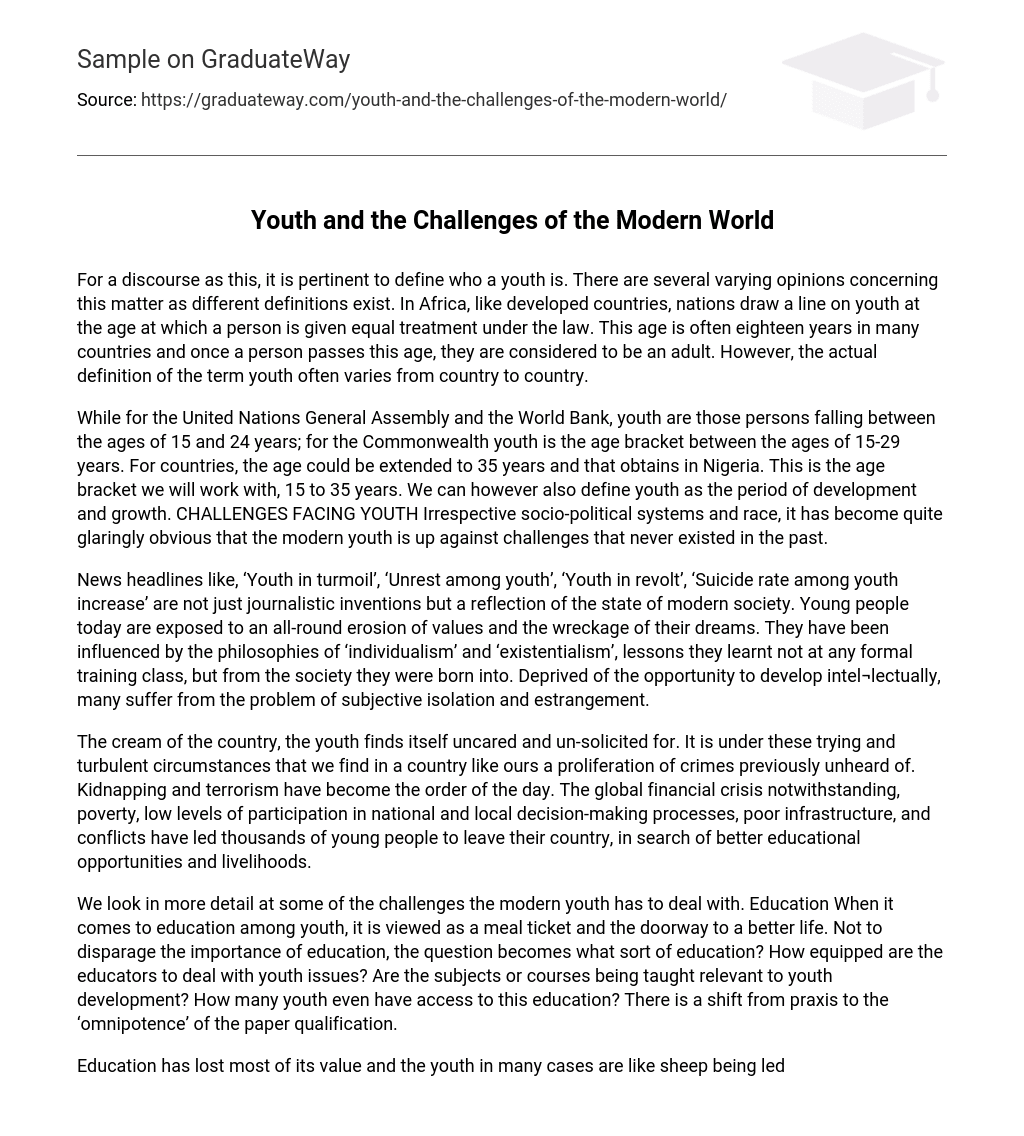For a discourse as this, it is pertinent to define who a youth is. There are several varying opinions concerning this matter as different definitions exist. In Africa, like developed countries, nations draw a line on youth at the age at which a person is given equal treatment under the law. This age is often eighteen years in many countries and once a person passes this age, they are considered to be an adult. However, the actual definition of the term youth often varies from country to country.
While for the United Nations General Assembly and the World Bank, youth are those persons falling between the ages of 15 and 24 years; for the Commonwealth youth is the age bracket between the ages of 15-29 years. For countries, the age could be extended to 35 years and that obtains in Nigeria. This is the age bracket we will work with, 15 to 35 years. We can however also define youth as the period of development and growth. CHALLENGES FACING YOUTH Irrespective socio-political systems and race, it has become quite glaringly obvious that the modern youth is up against challenges that never existed in the past.
News headlines like, ‘Youth in turmoil’, ‘Unrest among youth’, ‘Youth in revolt’, ‘Suicide rate among youth increase’ are not just journalistic inventions but a reflection of the state of modern society. Young people today are exposed to an all-round erosion of values and the wreckage of their dreams. They have been influenced by the philosophies of ‘individualism’ and ‘existentialism’, lessons they learnt not at any formal training class, but from the society they were born into. Deprived of the opportunity to develop intel¬lectually, many suffer from the problem of subjective isolation and estrangement.
The cream of the country, the youth finds itself uncared and un-solicited for. It is under these trying and turbulent circumstances that we find in a country like ours a proliferation of crimes previously unheard of. Kidnapping and terrorism have become the order of the day. The global financial crisis notwithstanding, poverty, low levels of participation in national and local decision-making processes, poor infrastructure, and conflicts have led thousands of young people to leave their country, in search of better educational opportunities and livelihoods.
We look in more detail at some of the challenges the modern youth has to deal with. Education When it comes to education among youth, it is viewed as a meal ticket and the doorway to a better life. Not to disparage the importance of education, the question becomes what sort of education? How equipped are the educators to deal with youth issues? Are the subjects or courses being taught relevant to youth development? How many youth even have access to this education? There is a shift from praxis to the ‘omnipotence’ of the paper qualification.
Education has lost most of its value and the youth in many cases are like sheep being led without a voice of their own under the impression that after school comes fulfilment. While literacy rates have increased in the past years, more young people are being considered illiterate in the sense of being unemployable. The education system is slowly crumbling and poses a serious challenge both for young people now and coming generations. Employment Employment remains the main concern of youth in Nigeria and indeed most of Africa.
The exceptionally high unemployment rates in Africa can be interpreted as one of the main factors behind the revolutionary activity and recent civil unrest in North Africa and elsewhere in the region. In Nigeria the youth unemployment rate currently stands at 29. 8% Two of the principal reasons for the high unemployment rates are: a mismatch between educational systems and the skills needed in the labour market, and the saturated public services and small private sector bases that are unable to employ large numbers of people.
Other relevant reasons include labour demand barriers, such as observed discrimination by employers towards young people on the grounds of lack of experience; information gaps between job seekers and potential employers; and barriers to the creation and development of business opportunities, particularly in gaining access to financial, physical and social capital. Another reason for high youth unemployment rates is a mindset that tells educated young people that they must be employed in white-collar jobs. In relation to this sentiment, a low status is also afforded to vocational training.
Furthermore, most young people in Africa do not finish school and universities with a plan to engage in self-employment. Additionally, the ILO’s 2010 Youth Employment Report notes that, while unemployment is relatively high across Africa, the degree of underemployment and working poverty is even greater, thus pointing to a lack of adequate job opportunities for youth. Health With the structural challenges and weak healthcare systems, linked to the high cost of proper health care and prevailing poverty, the youthful population is greatly affected and put at risk.
Disease like HIV/AID, tuberculosis, malaria are among the top five killers of youth in Nigeria. HIV/AIDS remains one of the biggest youth public health issue and is responsible for a lot of deaths although there are no accurate statistic figures to work with. Participation in the Decision-Making Process Efforts to engage youth in policy formulation have increased over the past few years at all levels. However, youth involvement is usually restricted to election years when their votes are solely needed to bring a government to power.
Most national youth councils and youth parliaments are often limited to one-off events. Evidence of current and ongoing activities tends to be lacking. Few opportunities exist for active youth participation in decision-making processes due to limited skills, tools and resources, among both young people and the Governments that are required to engage in effective consultative processes, and to implement action plans. Often, Governments lack an understanding of the benefits of youth involvement in consultation process, and advocacy based groups has limited capacity to maintain momentum for continued actions.





